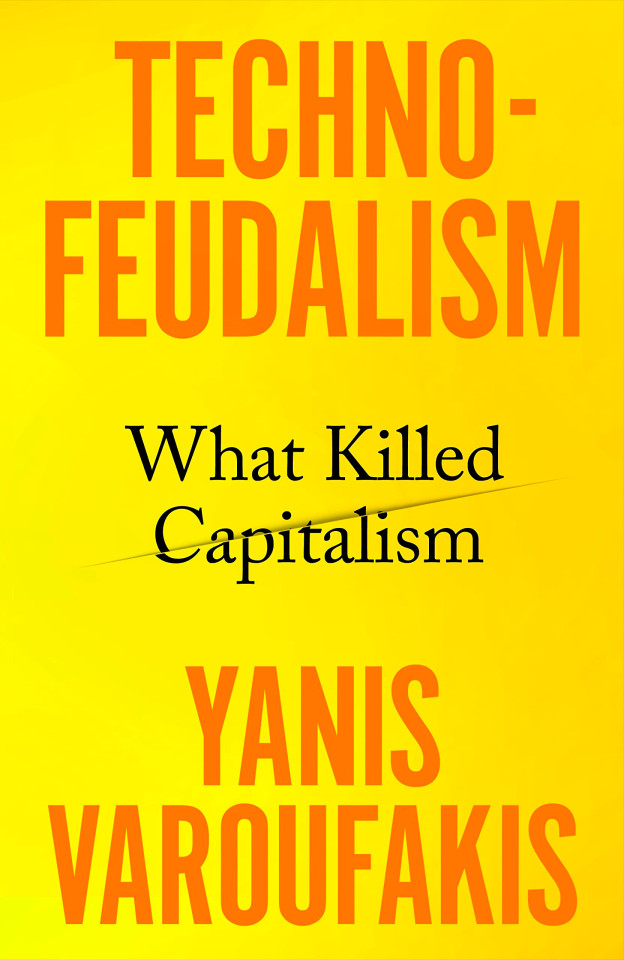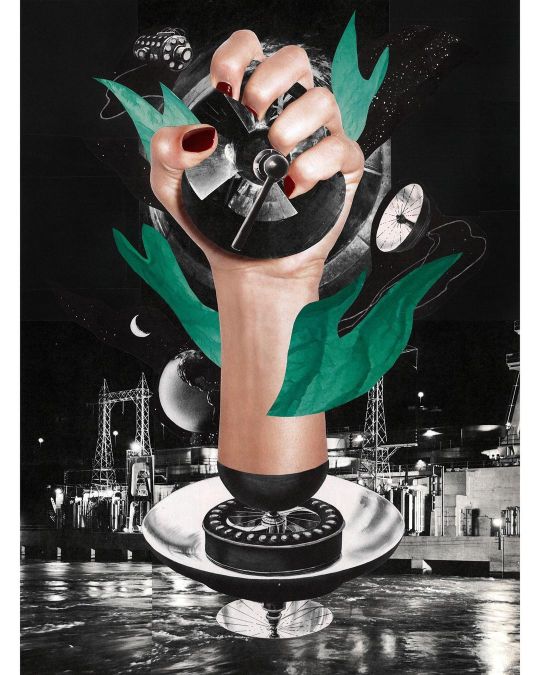#postcapitalism
Text
Yanis Varoufakis’s “Technofeudalism: What Killed Capitalism?”

Monday (October 2), I'll be in Boise to host an event with VE Schwab. On October 7–8, I'm in Milan to keynote Wired Nextfest.

Socialists have been hotly anticipating the end of capitalism since at least 1848, when Marx and Engels published The Communist Manifesto - but the Manifesto also reminds us that capitalism is only too happy to reinvent itself during its crises, coming back in new forms, over and over again:
https://www.nytimes.com/2022/10/31/books/review/a-spectre-haunting-china-mieville.html
Now, in Technofeudalism: What Killed Capitalism, Yanis Varoufakis - the "libertarian Marxist" former finance minister of Greece - makes an excellent case that capitalism died a decade ago, turning into a new form of feudalism: technofeudalism:
https://www.penguin.co.uk/books/451795/technofeudalism-by-varoufakis-yanis/9781847927279
To understand where Varoufakis is coming from, you need to go beyond the colloquial meanings of "capitalism" and "feudalism." Capitalism isn't just "a system where we buy and sell things." It's a system where capital rules the roost: the richest, most powerful people are those who coerce workers into using their capital (factories, tools, vehicles, etc) to create income in the form of profits.
By contrast, a feudal society is one organized around people who own things, charging others to use them to produce goods and services. In a feudal society, the most important form of income isn't profit, it's rent. To quote Varoufakis: "rent flows from privileged access to things in fixed supply" (land, fossil fuels, etc). Profit comes from "entrepreneurial people who have invested in things that wouldn't have otherwise existed."
This distinction is subtle, but important: "Profit is vulnerable to market competition, rent is not." If you have a coffee shop, then every other coffee shop that opens on your block is a competitive threat that could erode your margins. But if you own the building the coffee shop owner rents, then every other coffee shop that opens on the block raises the property values and the amount of rent you can charge.
The capitalist revolution - extolled and condemned in the Manifesto - was led by people who valorized profits as the heroic returns for making something new in this world, and who condemned rents as a parasitic drain on the true producers whose entrepreneurial spirits would enrich us all. The "free markets" extolled by Adam Smith weren't free from regulation - they were free from rents:
https://locusmag.com/2021/03/cory-doctorow-free-markets/
But rents, Varoufakis writes, "survived only parasitically on, and in the shadows of, profit." That is, rentiers (people whose wealth comes from rents) were a small rump of the economy, slightly suspect and on the periphery of any consideration of how to organize our society. But all that changed in 2008, when the world's central banks addressed the Great Financial Crisis by bailing out not just the banks, but the bankers, funneling trillions to the people whose reckless behavior brought the world to the brink of economic ruin.
Suddenly, these wealthy people, and their banks, experienced enormous wealth-gains without profits. Their businesses lost billions in profits (the cost of offering the business's products and services vastly exceeded the money people spent on those products and services). But the business still had billions more at the end of the year than they'd had at the start: billions in public money, funneled to them by central banks.
This kicked off the "everything rally" in which every kind of asset - real estate, art, stocks, bonds, even monkey JPEGs - ballooned in value. That's exactly what you'd expect from an economy where rents dominate over profits. Feudal rentiers don't need to invest to keep making money - remember, their wealth comes from owning things that other people invest in to make money.
Rents are not vulnerable to competition, so rentiers don't need to plow their rents into new technology to keep the money coming in. The capitalist that leases the oil field needs to invest in new pumps and refining to stay competitive with other oil companies. But the rentier of the oil field doesn't have to do anything: either the capitalist tenant will invest in more capital and make the field more valuable, or they will lose out to another capitalist who'll replace them. Either way, the rentier gets more rent.
So when capitalists get richer, they spend some of that money on new capital, but when rentiers get richer, them spend money on more assets they can rent to capitalists. The "everything rally" made all kinds of capital more valuable, and companies that were transitioning to a feudal footing turned around and handed that money to their investors in stock buybacks and dividends, rather than spending the money on R&D, or new plants, or new technology.
The tech companies, though, were the exception. They invested in "cloud capital" - the servers, lines, and services that everyone else would have to pay rent on in order to practice capitalism.
Think of Amazon: Varoufakis likens shopping on Amazon to visiting a bustling city center filled with shops run by independent capitalists. However, all of those capitalists are subservient to a feudal lord: Jeff Bezos, who takes 51 cents out of every dollar they bring in, and furthermore gets to decide which products they can sell and how those products must be displayed:
https://pluralistic.net/2022/11/28/enshittification/#relentless-payola
The postcapitalist, technofeudal world isn't a world without capitalism, then. It's a world where capitalists are subservient to feudalists ("cloudalists" in Varoufakis's thesis), as are the rest of us the cloud peons, from the social media users and performers who fill the technofuedalists' siloes with "content" to the regular users whose media diet is dictated by the cloudalists' recommendation systems:
https://pluralistic.net/2023/01/21/potemkin-ai/#hey-guys
A defining feature of cloudalism is the ability of the rentier lord to destroy any capitalist vassal's business with the click of a mouse. If Google kicks your business out of the search index, or if Facebook blocks your publication, or if Twitter shadowbans mentions of your product, or if Apple pulls your app from the store, you're toast.
Capitalists "still have the power to command labor from the majority who are reliant on wages," but they are still mere vassals to the cloudalists. Even the most energetic capitalist can't escape paying rent, thanks in large part to "IP," which I claim is best understood as "laws that let a company reach beyond its walls to dictate the conduct of competitors, critics and customers":
https://locusmag.com/2020/09/cory-doctorow-ip/
Varoufakis points to ways that the cloudalists can cement their gains: for example, "green" energy doesn't rely on land-leases (like fossil fuels), but it does rely on networked grids and data-protocols that can be loaded up with IP, either or both of which can be turned into chokepoints for feudal rent-extraction. To make things worse, Varoufakis argues that cloudalists won't be able to muster the degree of coordination and patience needed to actually resolve the climate emergency - they'll not only extract rent from every source of renewables, but they'll also silo them in ways that make them incapable of doing the things we need them to do.
Energy is just one of the technofeudal implications that Varoufakis explores in this book: there are also lengthy and fascinating sections on geopolitics, monetary policy, and the New Cold War. Technofeudalism - and the struggle to produce a dominant fiefdom - is a very useful lens for understanding US/Chinese tech wars.
Though Varoufakis is laying out a technical and even esoteric argument here, he takes great pains to make it accessible. The book is structured as a long open letter to his father, a chemical engineer and leftist who was a political prisoner during the fascist takeover of Greece. The framing device works very well, especially if you've read Talking To My Daughter About the Economy, Varoufakis's 2018 radical economics primer in the form of a letter to his young daughter:
https://us.macmillan.com/books/9780374538491/talkingtomydaughterabouttheeconomy
At the very end of the book, Varoufakis calls for "a cloud rebellion to overthrow technofeudalism." This section is very short - and short on details. That's not a knock against the book: there are plenty of very good books that consist primarily or entirely of analysis of the problems with a system, without having to lay out a detailed program for solving those problems.
But for what it's worth, I think there is a way to plan and execute a "cloud rebellion" - a way to use laws, technology, reverse-engineering and human rights frameworks to shatter the platforms and seize the means of computation. I lay out that program in The Internet Con: How the Seize the Means of Computation, a book I published with Verso Books a couple weeks ago:
https://www.versobooks.com/products/3035-the-internet-con

If you'd like an essay-formatted version of this post to read or share, here's a link to it on pluralistic.net, my surveillance-free, ad-free, tracker-free blog:
https://pluralistic.net/2023/09/28/cloudalists/#cloud-capital
#pluralistic#yanis varoufakis#socialism#communism#technofeudalism#economics#postcapitalism#political science#rent-seeking#rentiers#books#reviews#gift guide
733 notes
·
View notes
Text
"Reuse and upcycle everything you can. Not just because it's good for the planet, but because you'll be forced to in the near future, anyway."
65 notes
·
View notes
Text
youtube
5 Myths About Degrowth Debunked
8 notes
·
View notes
Text










Dziś po raz pierwszy zrobiłam selfie roku w Sarbinowie i jednocześnie uchwyciłam w 10 zdjęciach postkapitalizm.
#postcapitalism#kapitalizm#poland#polska#nad morzem#seaside#bałtyk#sarbinowo#zima#winter#camp#kicz#zło#dobro
5 notes
·
View notes
Video
youtube
0 notes
Text

A post-capitalist summer series at ZK/U. On Thursday evenings, outdoors, with a shared meal and two performances.
Selected Thursdays, July - September 2022
ZK/U BerlinSiemensstr. 27, 10551, Berlin, Germany
28. July, 4. August, 18. August, 8. September, 15. September, 29. September
How can we ever move beyond established extractive structures, if all our desires and attention are captured inside? If we never have enough time, if moving within is what's rewarded, or even tied to immediate survival?
Towards a Shimmer on the Horizon aims to explore steps, practices, thoughts and sounds that could shift consciousness towards post-capitalist desires, that may illuminate new structuring elements of society, that open up wishful imagination, that could give a glimpse of shimmering possibilities. The series is not about the distant utopia, but rather about exploring a next step towards a shimmer of a world that is not structured by extraction and power, from different positions, and acknowledging existing damage, precarity & complexity.
Looking into dimensions such as time, care, grief, desire, repair, failure and possibly more Towards a Shimmer on the Horizon looks forward to researching and experimenting, to inspiring and questioning, and also to sharing and enjoying summer evenings with conversations, food and togetherness.
The series is inspired by Mark Fisher's lectures on post-capitalist desire from 2016, in which Fisher researched practices, theories or emotions that would lead to even just desire something beyond capitalist structures. For example he looked into feminist consciousness-raising groups of the 1970s, that would identify individual problems as structural through collective sharing; or pop music that could lead to a glimpse of utopian possibility in a fleeting moment.
WE HAVE SOME FREE SPOTS: If the above resonates, and you would like to propose a performance, live radioshow, reading, sounds, collective activity: Please write to andrea.goetzke(at)posteo.de by July 15. What has shifted your mind that you would like to share? Which structuring principle would you like to rethink? Where would you suggest to look when searching for the shimmer?
0 notes
Photo

Moloch II - Handmade collage . . . . . #collage #collageartist #collageart #C_expo #handmade #artwork #fashion #fashioncollage #surreal #mokkapresti #moloch #industry #capitalism #postcapitalism #apocalypse #ginsberg #woman #blind #postindustrial #anxiety #machine #metropolis #space #dystopia #scifi (at Crossness Pumping Station) https://www.instagram.com/p/Cc7vPbQqiYi/?igshid=NGJjMDIxMWI=
#collage#collageartist#collageart#c_expo#handmade#artwork#fashion#fashioncollage#surreal#mokkapresti#moloch#industry#capitalism#postcapitalism#apocalypse#ginsberg#woman#blind#postindustrial#anxiety#machine#metropolis#space#dystopia#scifi
0 notes
Text
first grian creates bureaucracy in minecraft, then cub creates the potential for a centralised currency AND NOW SCAR IS CREATING A POLICE FORCE....... i fear it is too late for them to be saved
#watching the rise and fall of capitalism through the hermitcraft server#the industrial revolution and its consequences MINECRAFT EDITION#it's so funny to me#who do we think is gonna overthrow the cops#scar i love you but becoming a pig means i have to hate you until someone ends this#insert bdubs what is happening horn sound effect#hermitcraft postcapitalism era when?#hermitcraft#grian#cubfan135#gtwscar#gtws#horsemeatposting#hermitcraft 10
12 notes
·
View notes
Text
Imaginative problem
The fact is, postcapitalism was reduced to a largely imaginative problem during the rise of neoliberalism, at least in the imperial core. Mark Fisher explores this beautifully in Postcapitalist Desire which I highly recommend, but what is often lacking in Fisher's school of thought, which broadly I'd say are the Marxists very entrenched in a Hegelian perspective as opposed to the Marxists whose main focus is vanguardism or the Anarchists and other tendencies of socialist who are more real-world-organising focused, is climate change. It's not that Fisher doesn't grapple with the climate emergency ever or never talked about it, but the starting point for a lot of my thought nowadays and the thought of a lot socialists you can read in this decade is the fact that climate change is about to make capitalism look like a twink at Klub Verboten on 3am.
Even in liberal analyses of climate change like David Wallace-Wells' The Uninhabitable Earth which is incredibly limited by its unwillingness or perhaps incapability to imagine the end of capitalism, you'll see figures explaining how 2, 3, 4 degrees of warming will do damage to the planet which (and you should never do this) measured in dollars is equal to more than twice the total wealth extant in the world today. The fact is, capitalist supply chains are not going to survive climate change, capitalist work as a concept probably won't be able to survive very far into the climate crisis, and a lot of the biggest political movements and disruptions we've seen in the last 15 years have been driven, exacerbated or at least contributed to by climate change.
What Fisher's school of thought correctly identifies is that neoliberalism left us in this bizarre inescapable illusion called capitalist realism where our pervasive understanding that capitalism is everywhere and inescapable reinforces itself to make itself feel all the more inescapable. This analysis is all the more demonstrably true if you consider it from the perspective of an abstract entity that wants to perpetuate capitalism - an imaginary sort of mastermind that you can use to project the reactive impulses that capital can use to protect itself, without straying too far into Nick Land's "global AI network" brainworms. Modern connected supply chains and advancement of technology have practically eliminated scarcity, but in order for their to be profits under capitalism there HAS to be scarcity, so it's not just that capitalism is cauing inequal distribution and suffering, it's that capitalism cannot survive without manufacturing that artificial scarcity. So the material function of capitalism is all a pretence, a carefully coordinated elaborate dance, and great, you'd think, more and more people can see that and surely that farce can't hold, but it can! and it is! and it will! Capitalist cultural hegemony is actually very good at maintaining itself and keeping us all within its thrall, especially since, as already commented, its main job at this point is to control this intersubjective illusion. It only has to do two things: manufacture scarcity; keep us from developing class consciousness - and from a point where scarcity has been practically eliminated but is under the control of capital, the system can constantly point to the success of the human race as the success of capitalism, simultaneously reinforcing that the current inequal distribution of resources is simply the best we could ever possibly have, and also reminding us how eternal and inescapable capitalism is.
Where climate change comes crashing in like an unmanned tanker skidding across Manhattan in a blizzard is that with real material challenges, capitalism's excuses wear really thin really fast actually. The ideological nonsense evaporates in a moment when your neighbourhood floods and you and your neighbours work together to keep everyone safe and share all your resources in order to make sure you all survive. Many people will keep trying to do capitalist work in an unstable and unsafe climate, but more and more people will withdraw from the material infrastructure of capitalism as crisis worsens and as they do the imaginative shackles that we've been kept in with loosen. Counterintuitively, the problem that "it's easier to imagine the end of the world than the end of capitalism" isn't going to result in us all holding hands around the dinner table while the world burns, it's going to push us to a point where we say "what a load of bullshit, why would I do anything for this capitalist notion of work when I could be working less, living more, and surviving the climate crisis".
I just think a lot of people learn to understand the ideological trap that Fisher et al describe and it drains them of all hope, but when you start from the place that climate change is factually, economically, scientifically, GOING to kill capitalism, you realise that the knock on effects of that will free us, and then you've got that sweet delicious revolutionary optimism baby. Capitalism has failed, it is going to die, and something better is coming, and it comes all the faster the more we prepare now. The cop in your head can't even be mad, because it's not even like you're plotting to redacted in roblox or whatever, you can simply observe what's coming, and when you see that you can see that the new reality people will live in when they are imaginatively free is beautiful.
Some day sooner or later it will hit people, one by one, like a blinding light: We deserve everything, and I'm not going to ever let them tell me otherwise
56 notes
·
View notes
Text
preworkout.. postcapitalism.... preschool..... tumblr post....
5 notes
·
View notes
Text
Paul Mason declares " with the end of feudalism 500 years ago, capitalism's replacement by postcapitalism will be accelerated by external shocks and shaped by the emergence of a new kind of human being. the rise of collaborative will help capitalism to kill itself.
2 notes
·
View notes
Text
保罗·梅森在《后资本主义》(PostCapitalism)等著作中,沿着“加速主义路线”试图推测资本主义之后的未来。他宣称,“随着500年前封建主义的终结,资本主义被后资本主义系统的替代将被外部冲击加速,并且被新型人类的出现所塑形,而它已经开始。”他认为,合作生产的兴起将有助于资本主义覆亡。
4 notes
·
View notes
Photo

「笑顔」 貴方は前を向き乍ら背中を見せていた そこにいる限り、 命は右頬に 死は左頬に あるというのに。 You were looking forward, but your back was to me. As long as you were there. Life is on your right cheek. Death is on your left cheek. * * * * * * * * * * * * * #face #笑顔 #portrait #contemporaryart #nycart #顔 #paint #artpainting #japanese #artdaily #notime #絵画 #日本 #現代アート #artgalleries #abstractart #back #言語 #赤 #antipop #絵画 #abstractpainting #vaporwave #postcapitalism #芸術 #pain #art #artist #newera (Japan) https://www.instagram.com/p/Cg6ZY6GuyLS/?igshid=NGJjMDIxMWI=
#face#笑顔#portrait#contemporaryart#nycart#顔#paint#artpainting#japanese#artdaily#notime#絵画#日本#現代アート#artgalleries#abstractart#back#言語#赤#antipop#abstractpainting#vaporwave#postcapitalism#芸術#pain#art#artist#newera
3 notes
·
View notes
Text
Paul Mason declares " with the end of feudalism 500 years ago, capitalism's replacement by postcapitalism will be accelerated by external shocks and shaped by the emergence of a new kind of human being. the rise of collaborative will help capitalism to kill itself.
0 notes
Text
Paul Mason declares " with the end of feudalism 500 years ago, capitalism's replacement by postcapitalism will be accelerated by external shocks and shaped by the emergence of a new kind of human being. the rise of collaborative will help capitalism to kill itself.
0 notes